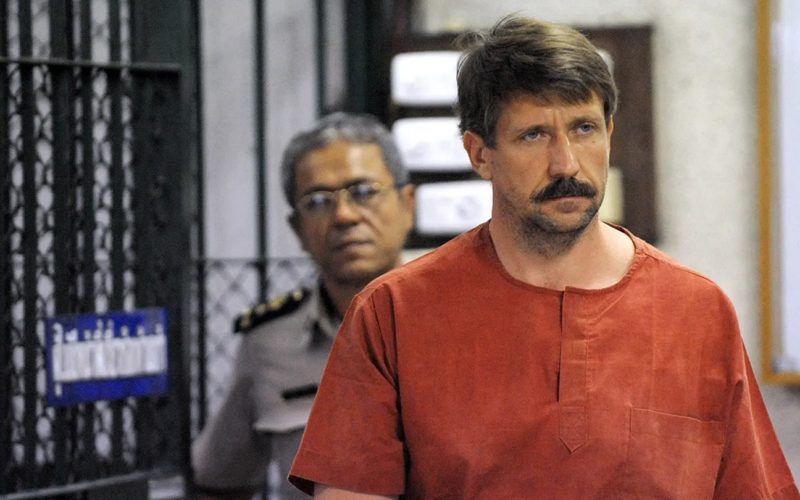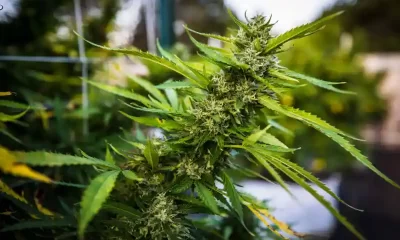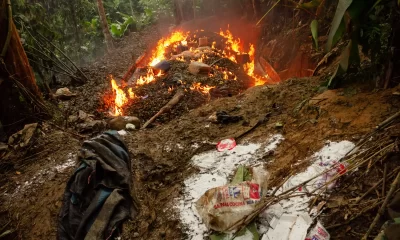Crime
Biden Administration Proposes Prisoner Swap To Free Brittney Griner

The Biden administration revealed on Wednesday that it has offered to release a Russian arms dealer being held in a U.S. prison in exchange for Brittney Griner and Paul Whelan, two Americans imprisoned in Russia.
Secretary of State Anthony Blinken revealed on Wednesday that the United States has offered to release a Russian arms dealer imprisoned in the United States in exchange for the release of WNBA superstar Brittney Griner and Paul Whelan, both U.S. citizens currently being held by the Russian government. Blinken added that the U.S. had presented a “substantial proposal” for the release of Griner and Whelan, who have been classified as “wrongfully detained” by the Department of State.
Blinken said at a State Department news conference on Wednesday that President Joseph Biden was “directly involved” and had approved the proposal. He did not specifically confirm that Bout was part of the proposed exchange, saying that he “can’t and won’t get into any of the details of what we proposed to the Russians over the course of so many weeks now,” according to a report from CNN.
Blinken continued that “in terms of the President, of course he was not only directly involved, he signs off on any proposal that we make, and certainly when it comes to Americans who are being arbitrarily detained abroad, including in this specific case.”
Undisclosed sources close to the matter told CNN that the president’s support for the prisoner exchange trumped opposition from the Department of Justice, which generally opposes such deals as a matter of course.
The Russian government was quick to point out that the U.S. proposal has not yet been accepted. Kremlin spokesman Dmitry Peskov said on Thursday that “so far, there is no agreement on this issue.”
Blinken said that he planned to discuss the issue with Russian Foreign Minister Sergey Lavrov during a telephone call this week, adding that “my hope would be that in speaking to Foreign Minister Lavrov, I can advance the efforts to bring them home.”
“There is in my mind utility in conveying clear, direct messages to the Russians on key priorities for us,” Blinken said. “And as I mentioned, these include securing the return home of Brittney Griner and Paul Whelan.”
Griner Arrested for Cannabis Possession in February
Griner, the star center for the WNBA’s Phoenix Mercury and a two-time women’s basketball Olympic champion, was arrested by Russian authorities at an airport outside Moscow in February after customs officials allegedly found vape cartridges containing less than one gram of cannabis oil in her luggage. Griner has pleaded guilty to the charges she faces, which could send her to prison for up to 10 years. Her trial continues at a courthouse in the Moscow suburb of Kimki as authorities hear additional testimony before deciding her fate.
Whelan has been held by Russian authorities since 2018 on espionage charges. If the offer from the Biden administration is accepted by the Russian government, Griner and Whelan would be exchanged for Viktor Bout, a Russian convicted of arms trafficking in 2018 who is serving a 25-year prison sentence in the United States.
A senior Biden administration official said that the Russian government was unresponsive to the “substantial offer” presented in June, adding that “it takes two to tango.”
“We start all negotiations to bring home Americans held hostage or wrongfully detained with a bad actor on the other side. We start all of these with somebody who has taken a human being American and treated them as a bargaining chip,” the official said. “So in some ways, it’s not surprising, even if it’s disheartening, when those same actors don’t necessarily respond directly to our offers, don’t engage constructively in negotiations.”
The official did not reveal the conditions of the offer, saying it was in Russia’s “court to be responsive to it, yet at the same time that does not leave us passive, as we continue to communicate the offer at very senior levels.”
National Security Council Strategic Coordinator for Communications John Kirby said on Wednesday that Biden administration officials had spoken with the families of Griner and Whelan before Blinken revealed the prisoner exchange offer. He added that the White House is focused on bringing the two Americans home.
“We urge the Russians to move positively on that proposal, so we can get these two individuals home,” Kirby said. “The details of it, I think, are best left between us and our Russian counterparts.”
Apparently unhappy with the Biden administration for making the offer public, the Kremlin noted that prisoner exchange deals are usually negotiated discreetly.
“We know that such issues are discussed without any such release of information,” Peskov told reporters during a conference call. “Normally, the public learns about it when the agreements are already implemented.”
Griner’s attorneys, Alexander Boykov and Maria Blagovolina, said that the WNBA star’s trial will have to conclude before an exchange can be negotiated.
“From a legal point of view, the exchange is possible only after a court verdict,” the lawyers said, as quoted by the Russian media outlet RBC. “In any case, we will be glad if Brittney is soon at home and we hope that this will happen.”
Source: https://hightimes.com/news/biden-administration-proposes-prisoner-swap-to-free-brittney-griner/
Business
Pittsburgh Advocates Unite To Legalize Adult-Use Cannabis in Pennsylvania

Pittsburgh NORML is working to push forward legislation to allow cannabis for adults in Pennsylvania.
In Pennsylvania’s second-largest city, advocates are busy working to legalize adult-use cannabis.
Last month, two lawmakers introduced Senate Bill 846 to legalize adult-use cannabis in Pennsylvania. The bill currently waits for review from the Senate Law and Justice Committee for further deliberation. Next Pittsburgh reports that advocates at a local Pittsburgh branch of NORML are gearing up for legalization efforts in the state.
“This is a much bigger issue than just cannabis—it’s about giving people the right to be able to find health and wellness in the way that they want to and to not have to feel like the government will tell them how they’re allowed to heal,” says Gina Vensel, a cannabis educator and advocate in the area. Vensel is also on the executive committee of Pittsburgh NORML, the Pittsburgh branch of the National Organization for the Reform of Marijuana Laws (NORML).
SB 846 is a bipartisan effort and was spearheaded by Sens. Daniel Laughlin and Sharif Street. The bill would establish a Cannabis Regulatory Control Board, and allow adults 21 and over to purchase cannabis from retail locations. It would additionally allow medical cannabis cardholders to grow cannabis at home. Lastly it would expunge nonviolent cannabis-related convictions.
“Legalized adult use of marijuana is supported by an overwhelming majority of Pennsylvanians and this legislation accomplishes that while also ensuring safety and social equity,” Laughlin said in a statement. “With neighboring states New Jersey and New York implementing adult use, we have a duty to Pennsylvania taxpayers to legalize adult use marijuana to avoid losing out on hundreds of millions of dollars of new tax revenue and thousands of new jobs.”
Problems Remain in Pittsburgh
High Times reported in 2018 that Solevo Wellness was the city’s first medical dispensary, and is the fourth operating medical cannabis dispensary in the entire state of Pennsylvania. The process of establishing, licensing, and opening Solevo Wellness took about 18 months. The company credits much of their success in obtaining the proper permits to their hired industry consultant, Sara Gullickson.
Pittsburgh, located in Allegheny County, decriminalized cannabis in 2015. Part of the policy shift involved giving law enforcement a choice between arresting people for suspected cannabis offenses or simply giving them a citation. Further downstream the criminal legal system, prosecutors in Pennsylvania’s major cities enacted “decline to prosecute” policies for minor cannabis cases that went to trial.
Despite decriminalization locally, arrests for cannabis increased since Pittsburgh enacted decriminalization policies. Many officers at police departments are having a hard time letting go of the old policy, continuing to arrest rather than ticket suspected offenders.
Analyzing all the criminal dockets filed in Allegheny County from 2016 to 2017, The Appeal broke down the 2,100-some cases where the top charge was possession of less than 30 grams of cannabis. They also looked at the thousands of arrests for minor possession police made over the same period.
Of the 2,100-plus cannabis-related cases in Allegheny County where the defendant received a misdemeanor possession charge, 51 percent of the people charged were Black. According to the most recent U.S. census data from 2017, 13.4 percent of all Allegheny residents are Black. And the dramatic racial disparity across the county is even more acute in Pittsburgh: Black people were charged in more than 400 of the 600 cases filed by the Pittsburgh Police Department. Black people comprised two-thirds of all cannabis cases in the city, despite representing just 24.3 percent of the city’s population. In other words, Pittsburgh police charged Black people for cannabis twice as much as white people.
The Pittsburgh Pirates and Decriminalization
On a few notable occasions, Pittsburgh Pirate games provided a stage for decriminalization efforts and awareness.
Wiz Khalifa, a Pittsburgh native, is an advocate for both cannabis and psilocybin. He tossed the ceremonial first pitch on Monday at PNC Park in Pittsburgh, prior to a game between the Pittsburgh Pirates and Cleveland Guardians. “Finna get stoned af and throw this first pitch at the pirates game,” he tweeted, before following it up with more specifics. “Shroomed out throwin a baseball is crazy,” Wiz said in another tweet moments later.
Former Pirates pitcher Dock Ellis pulled off a pitch on acid as well on June 12, 1970.
It was on that day that Ellis reputedly threw a no-hitter while tripping on LSD.
“According to Ellis (and, it should be noted, all of this is according to Ellis), he went to visit a friend in Los Angeles the day before his start, took some acid and stayed up late into the night drinking and doing drugs, subsequently losing track of which day it was,” Sports Illustrated wrote in 2017. “The day of his start, he woke up and, thinking he was supposed to pitch the next day, took another hit of acid at noon, only to learn two hours later from his friend that he was, in fact, supposed to be on the mound against the Padres that evening in San Diego. Ellis got on a plane an hour later and made it to the park 90 minutes before first pitch.”
For the time being, advocates in the city remain busy at work.
Business
5 Of The Best True Crime Podcasts

There’s never been a better time for lovers of true crime stories. The topic, usually explored in books, novelizations, and TV dramas, is now experiencing a resurgence through Netflix documentaries and podcasts. The really great and notable works are being developed by experts in their respective fields, who deliver information on the cases in ways that are informative, sobering, terrifying, and always entertaining. Here are what we think are 5 of the best true crime podcasts.
Ever since Truman Capote wrote In Cold Blood, we have been drawn to true crime. So why not escape into the darkest experiences of our recent past?
Cold
“Cold” looks into the case of Susan Powell, a young mother of two who disappeared from Utah in 2009. The podcast dives deep into the story of her husband Josh, the prime suspect of her disappearance. Conducted by reporter Dave Cawley, the podcast analyzes Josh’s violent past in detail and supplements the story with journals and written accounts from observers, which paints a vivid and thorough picture of a case that will bug you long after your listening is over.
Crimetown
Season 2 of “Crimetown” is being released this year and it focuses on the city of Detroit, Michigan, mainly the rise and fall of Kwame Kilpatrick, the city’s youngest elected mayor who’s currently serving a 28-year prison sentence. The podcast begins in the 70s, with a racially charged police shoot-out, and continues to track the events that take place in Detroit over the years, painting an in-depth picture of the city and the entire community that was involved.
Happy Face
This twelve part podcast follows Melissa Moore as she reckons and follows the investigation of her father, Keith Hunter Jesperson, a man who was charged with the murder of eight women over the span of five years. Popularly known as the Happy Face Killer, Jesperson committed most of his known crimes during the early 90s. He earned his name from the smiley faced notes he used to send to policemen after his kills.
Dr. Death
Hosted and reported by science journalist Laura Beil, “Dr. Death” tells the story of Christopher Duntsch, a real life neurosurgeon who killed and maimed dozens of patients under his care. Over the span of two years, Duntsch operated on 38 patients, leaving two dead and 31 paralyzed or gravely injured. The podcast explores his life, his medical training, problems with drug abuse and finally, his imprisonment.
Serial
In its third season, “Serial” switches things up. The podcast that used to track a single crime per season, decided to set camp in a Cleveland courthouse and document the different cases that were filed. The podcast is comprised of nine episodes, each focusing on a different case and its subsequent journey through the justice system. The result is an interesting documentation of crimes that range in styles and that highlight how justice isn’t always served.
Hope you enjoy 5 of the best true crime podcasts!
Source: https://thefreshtoast.com/culture/5-of-the-best-true-crime-podcasts-2/
Crime
India: Man Dies in Police Custody After MDMA Arrest, Officers Suspended

Thamir Jifri, 30, died August 1 while in police custody for MDMA possession. A postmortem examination led to eight officers being suspended while an investigation is conducted re: alleged torture and beating.
Dear reader, we regret to inform you that the war on drugs has needlessly claimed another life, this time in southwest India where a man was arrested for MDMA possession shortly before dying in police custody.
Several different Indian news outlets have reported that Thamir Jiffri, age 30, was arrested in the early morning hours of August 1 in Tanur, a town of about 50,000 people in Kerala, India. He was arrested with four others for drug possession charges and died around 4:30 in the morning from what police said was a drug overdose.
The problem is police testimony directly conflicts with both accusations from the victim’s family as well as the post mortem examination. Jiffri’s family has publicly alleged that Thamir was not in fact arrested in Tanur on August 1 as police have attested. The family has accused the police of coming into their home in nearby Chelari, about a 20 minute drive to the northeast, the previous evening, beating Thamir in front of them and arresting him.
A public outcry followed Jiffri’s death. The following is a statement made by Indian Union Muslim League leader N. Samsudheen, a member of 15th Kerala Legislative Assembly:
“Jiffri was taken to the police quarters and subjected to third-degree torture. The postmortem report revealed that 21 wounds were inflicted on his body. This in itself is a proof of the kind of torture he was subjected to. Although Jiffri was taken into custody from his place at Chelari, the police claimed that he was arrested from under the railway bridge at Tanur. It has now also been revealed that he was sodomized in police custody.”
Eight police officers were suspended following Jiffri’s death. Samsudheen has publicly demanded the Malappuram Superintendent of Police be suspended as well.
“We raised the issue in the assembly. Regrettably, the government is yet to take appropriate action against the SP. We suspect the possibility of the SP’s involvement or knowledge in the custodial torture. To facilitate an unhindered investigation by the CBI, we firmly demand the removal of Malappuram SP,” Samsudheen said.
The postmortem examination referenced above also showed that two packets of a crystalline substance were found in Jiffri’s abdomen, though tracking down much more detail than that has proven difficult from my desk in California.
All of this information has been put together from about 10 different articles in Indian/East Asian news outlets, almost none of which fully agree with each other on every detail surrounding this case. To that end, about half of them spell Thamir’s name “Tamir Jiffri” or “Tamir/Thamir Geoffrey.” I don’t know if this is because accurate information is hard to come by in certain parts of the world or because online translators take certain auto-programmed liberties which can often lead to errors. It could be any number of things.
What I DO know is a young man appears to have been arrested either at his home or in a nearby town with some MDMA on him, a drug very near and dear to my own heart. That young man was dead hours later and a postmortem examination showed he took one hell of a beating before he died. All the police involved have been suspended and Jiffri’s family and local representatives have been demanding action be taken ever since.
It is also worth mentioning here that India has some extremely stringent laws regarding drug possession and use. Possession of small quantities of drugs in India is punishable by six months imprisonment and a $10,000 fine. Large amounts get you 10-20 years and habitual offenders are eligible for the death penalty. This is small beer compared to a country like Singapore where 15 people have been executed in the last year for drug use, but still a terrifying reality for anyone who wants to eat or sell a bit of Molly in India.
Thamir Jiffri’s family, Kerala Police, Malappuram Police and any of the journalists who wrote the articles I referenced did not return my attempts to contact them. Nonetheless, limited details of this terribly tragic situation have made their way all the way from Kerala, India to the West Coast of America, where pretty soon we’ll be paying exorbitant prices for some guy named Indica to doll us out two points of MDMA from his silly little doctor’s office in Palo Alto. At the risk of editorializing a bit, we mustn’t let stories like Thamir’s go untold as we fight to end the drug war in America because overseas they get executed, put into work camps, or allegedly beaten to death in police stations.
Source: https://hightimes.com/news/india-man-dies-in-police-custody-after-mdma-arrest-officers-suspended/
-

 Business2 years ago
Business2 years agoPot Odor Does Not Justify Probable Cause for Vehicle Searches, Minnesota Court Affirms
-

 Business2 years ago
Business2 years agoNew Mexico cannabis operator fined, loses license for alleged BioTrack fraud
-

 Business2 years ago
Business2 years agoAlabama to make another attempt Dec. 1 to award medical cannabis licenses
-

 Business2 years ago
Business2 years agoWashington State Pays Out $9.4 Million in Refunds Relating to Drug Convictions
-

 Business2 years ago
Business2 years agoMarijuana companies suing US attorney general in federal prohibition challenge
-

 Business2 years ago
Business2 years agoLegal Marijuana Handed A Nothing Burger From NY State
-

 Business2 years ago
Business2 years agoCan Cannabis Help Seasonal Depression
-

 Blogs2 years ago
Blogs2 years agoCannabis Art Is Flourishing On Etsy













